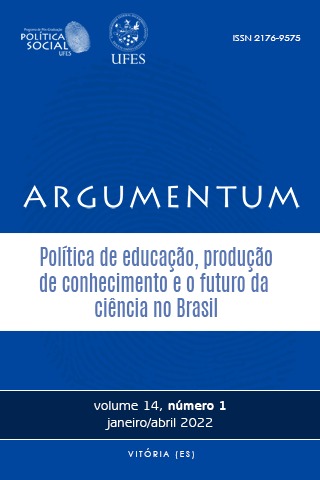The Institutional Market and PNAE: revealing aspects underlying the local implementation process
DOI:
https://doi.org/10.47456/argumentum.v14i1.34619Abstract
The Brazilian government is formulating and implementing public policies that seek to encourage the consumption of food from the agricultural sector and to contribute to the insertion of family farming into the institutional market, as in the case of the National School Food Programme (PNAE). Based on this premise, this article analyses the process of implementing the PNAE in the city of Coimbra - MG, revealing local actors, networks, and social interactions. Based on the framework of the new economic sociology, this qualitative study makes use of documentary research, interviews with actors from the public sector and civil society, and observation. The results indicate that the PNAE in the municipality studied is characterised by the flexibilization of the dynamics of social networks and by collaboration and integration among the actors, with mutual assistance and sharing of actions.
Downloads
Published
Issue
Section
License
Copyright Transfer Agreement
As a condition for submission, the authors must agree with the Copyright Transfer Agreement, by checking the box after reading the clauses.
The author(s) (hereinafter "AUTHOR") hereby agrees to transfer, without any financial compensation, the property of copyrights regarding Argumentum, a journal of the Postgraduate Program in Social Politics (Programa de Pós-graduação em Política Social), Federal University of Espírito Santo (Universidade Federal do Espírito Santo) - Av. Fernando Ferrari, 514 - Goiabeiras 29075-910, Vitória (Brazil), (hereinafter "ARGUMENTUM"), according to the following terms and conditions:
1. I am aware of the terms of "Care Ethics Research Guide" described in the Policies section.
2. AUTHOR warrants to be the writer and copyright holder of the WORK submitted.
3. AUTHOR declares that the WORK does not infringe the rights of third-parties; that the distribution of images (if existent) was authorized; and that AUTHOR assumes total moral and property responsibility for their content.
4. AUTHOR agrees to transfer all the copyrights concerning the WORK to ARGUMENTUM, especially the rights to edit, publish, translate into another language, and reproduce it through any process or technique. ARGUMENTUM becomes the exclusive owner of the rights regarding the WORK, and any total or partial reproduction, in any other medium, printed or electronic, is strictly forbidden without prior written consent by ARGUMENTUM.
5. The copyright transfer is unpaid and, therefore, there will be no monetary compensation whatsoever by ARGUMENTUM in order to use the TEXT.

